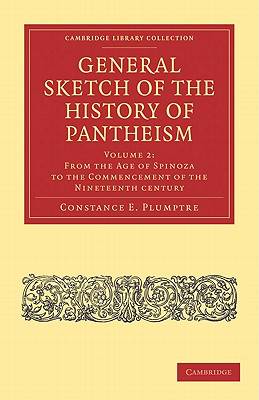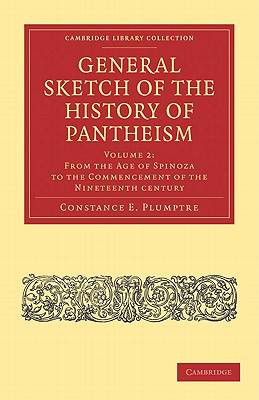
- Afhalen na 1 uur in een winkel met voorraad
- Gratis thuislevering in België vanaf € 30
- Ruim aanbod met 7 miljoen producten
- Afhalen na 1 uur in een winkel met voorraad
- Gratis thuislevering in België vanaf € 30
- Ruim aanbod met 7 miljoen producten
Zoeken
Omschrijving
A perceptive thinker and author of five scholarly tomes as well as numerous essays, the philosopher and historian of religion, Constance E. Plumptre is now unfamiliar to many readers. Yet for a period of just over twenty years between 1878 and 1902 she championed some of the most fascinating philosophical and religious theories of the Victorian age. Although she won greatest acclaim for Studies in Little-Known Subjects (1898), her first work, General Sketch of the History of Pantheism, published anonymously in 1878, was one of the most significant nineteenth-century studies in theological philosophy. In this second volume Plumptre continues her account of modern Pantheism and introduces the reader to the works of Spinoza, Fichte, Hegel and Schopenhauer, before concluding with a brief but insightful summary of this substantial philosophical question. For more information on this author, see http: //orlando.cambridge.org/public/svPeople?person_id=plumce
Specificaties
Betrokkenen
- Auteur(s):
- Uitgeverij:
Inhoud
- Aantal bladzijden:
- 360
- Taal:
- Engels
- Reeks:
Eigenschappen
- Productcode (EAN):
- 9781108028028
- Verschijningsdatum:
- 2/06/2011
- Uitvoering:
- Paperback
- Formaat:
- Trade paperback (VS)
- Afmetingen:
- 140 mm x 216 mm
- Gewicht:
- 458 g

Alleen bij Standaard Boekhandel
+ 157 punten op je klantenkaart van Standaard Boekhandel
Beoordelingen
We publiceren alleen reviews die voldoen aan de voorwaarden voor reviews. Bekijk onze voorwaarden voor reviews.











